|
|
|
Sort Order |
|
|
|
Items / Page
|
|
|
|
|
|
|
| Srl | Item |
| 1 |
ID:
131489
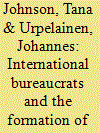

|
|
|
|
|
| Publication |
2014.
|
| Summary/Abstract |
Bureaucrats working in international intergovernmental organizations (IGOs) regularly help states design new IGOs. Sometimes international bureaucrats possess limited discretion in institutional design; sometimes, they enjoy broad discretion. In fact, they gain discretion even when they openly oppose state preferences. This contravenes conventional thinking about delegation: discretion should decrease as preference divergence between states and international bureaucrats increases. We develop a principal-agent theory of how much discretion states grant to international bureaucrats in the design of new IGOs. This is novel: while principal-agent theories of international delegation are common, scholars have not analyzed principal-agent relationships in the creation of new IGOs. We argue that even an international bureaucracy that disagrees with states' design preferences may enjoy substantial design leeway, because of states' need for bureaucratic expertise. In developing this argument, we employ a formal principal-agent model, case studies, and an original data set.
|
|
|
|
|
|
|
|
|
|
|
|
|
|
|
|
| 2 |
ID:
131486
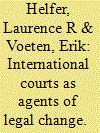

|
|
|
|
|
| Publication |
2014.
|
| Summary/Abstract |
Do international court judgments influence the behavior of actors other than the parties to a dispute? Are international courts agents of policy change or do their judgments merely reflect evolving social and political trends? We develop a theory that specifies the conditions under which international courts can use their interpretive discretion to have system-wide effects. We examine the theory in the context of European Court of Human Rights (ECtHR) rulings on lesbian, gay, bisexual, and transgender (LGBT) issues by creating a new data set that matches these rulings with laws in all Council of Europe (CoE) member states. We also collect data on LGBT policies unaffected by ECtHR judgments to control for the confounding effect of evolving trends in national policies. We find that ECtHR judgments against one country substantially increase the probability of national-level policy change across Europe. The marginal effects of the judgments are especially high where public acceptance of sexual minorities is low, but where national courts can rely on ECtHR precedents to invalidate domestic laws or where the government in power is not ideologically opposed to LGBT equality. We conclude by exploring the implications of our findings for other international courts.
|
|
|
|
|
|
|
|
|
|
|
|
|
|
|
|
| 3 |
ID:
131484
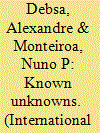

|
|
|
|
|
| Publication |
2014.
|
| Summary/Abstract |
Large and rapid power shifts resulting from exogenous economic growth are considered sufficient to cause preventive wars. Yet most large and rapid shifts result from endogenous military investments. We show that when the investment decision is perfectly transparent, peace prevails. Large and rapid power shifts are deterred through the threat of a preventive war. When investments remain undetected, however, states may be tempted to introduce power shifts as a fait accompli. Knowing this, their adversaries may strike preventively even without conclusive evidence of militarization. In fact, the more effective preventive wars are, the more likely they will be launched against states that are not militarizing. Our argument emphasizes the role of imperfect information as a cause of war. It also explains why powerful states may attack weaker targets even with ambiguous evidence of their militarization. We illustrate our theory through an account of the 2003 US-led invasion of Iraq.
|
|
|
|
|
|
|
|
|
|
|
|
|
|
|
|
| 4 |
ID:
131487
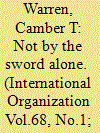

|
|
|
|
|
| Publication |
2014.
|
| Summary/Abstract |
Scholars of civil conflict have long recognized the importance of state strength in the suppression of nascent insurgencies. However, previous empirical investigations have generally focused on the material and coercive dimensions of state power, obscuring the critical role played by the generation of widespread voluntary compliance through processes of political communication, that is, the production of "soft power." In contrast, in this article I focus on a factor-mass communication technology-that can enhance state capacity only by strengthening the state's ability to broadly and publicly disseminate political messages. I argue that the enhanced capacities for large-scale normative influence generated by mass communication technologies can be expected to produce substantial barriers to the mobilization of militarized challenges to state rule, by strengthening economies of scale in the marketplace of ideas. Utilizing newly compiled cross-national data on mass media accessibility in the post-World War II period, I show that densely constituted mass media systems dramatically reduce the probability of large-scale civil violence, thereby providing new evidence for the fundamental importance of nonmaterial state capacities in the suppression of internal armed conflicts.
|
|
|
|
|
|
|
|
|
|
|
|
|
|
|
|
| 5 |
ID:
131490
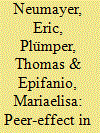

|
|
|
|
|
| Publication |
2014.
|
| Summary/Abstract |
Existing accounts posit that defensively oriented counterterrorist policies create negative externalities and result in regulatory competition that induces governments to increasingly tighten their policies. We argue that rather than causing an unconditional global "race to the top," spatial dependence in counterterrorist policies is limited to within groups of countries exposed to a similar level of threat from international terrorism. Countries strongly differ in their propensity to become the target of an international terror attack. Governments can safely ignore counterterrorist policies enacted by countries outside their "peer group," but they must pay attention to measures undertaken by their peers. We test several predictions derived from our theory in an empirical analysis of counterterrorist regulations in twenty Western developed-country democracies over the period 2001 to 2008.
|
|
|
|
|
|
|
|
|
|
|
|
|
|
|
|
| 6 |
ID:
131491
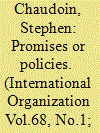

|
|
|
|
|
| Publication |
2014.
|
| Summary/Abstract |
A key assumption of audience costs theories of crisis bargaining and international cooperation is that audience members have strong preferences for consistency between their leader's commitments and actual policy choices. However, audiences also have strong preferences over the policy choices themselves, regardless of their consistency with past commitments. I conducted a randomized survey experiment to evaluate the magnitude of consistency and policy effects in the context of international agreements over trade policy. Respondents with expressed policy preferences, whether supporting or opposing free trade, have muted reactions to learning that their leader has broken an agreement. Only respondents with no opinion on trade policy are affected by learning that their leader's policy is inconsistent with prior commitments. This suggests that constituents' underlying preferences limit the degree to which audience costs influence policymakers' calculations
|
|
|
|
|
|
|
|
|
|
|
|
|
|
|
|
| 7 |
ID:
131485


|
|
|
|
|
| Publication |
2014.
|
| Summary/Abstract |
If any group of American blue-collar workers has benefited from the growth of trade it is the unionized dockworkers along the US West Coast. Nevertheless, the International Longshore and Warehouse Union (ILWU) representing these workers is vocally opposed to trade liberalization. We examine several competing explanations for this puzzle and evaluate them by tracing the union's stance on trade over several decades. We also use an original survey to compare ILWU affiliates' attitudes on trade with those of nonmembers with otherwise similar characteristics. Consistent with a model of organizational socialization, the data support the hypothesis that ILWU membership affects the members' revealed political opinions; the data are difficult to reconcile with standard theories of international trade. Our findings indicate that the political support for trade depends not just on voters' structural positions in the economy but also on the organizations and networks in which they are embedded.
|
|
|
|
|
|
|
|
|
|
|
|
|
|
|
|
| 8 |
ID:
131488
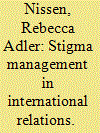

|
|
|
|
|
| Publication |
2014.
|
| Summary/Abstract |
This article develops a theoretical approach to stigma in international relations and resituates conventional approaches to the study of norms and international order. Correcting the general understanding that common values and norms are the building blocks of social order, this article claims that international society is in part constructed through the stigmatization of "transgressive" and norm-violating states and their ways of coping with stigma. Drawing on Erving Goffman, this article shows that states are not passive objects of socialization, but active agents. Stigmatized states cope strategically with their stigma and may, in some cases, challenge and even transform a dominant moral discourse. A typology of stigma management strategies is presented: stigma recognition (illustrated by Germany); stigma rejection (illustrated by Austria); and finally counter-stigmatization (illustrated by Cuba). Because of the lack of agreement on what constitutes normal state behavior, attempts to impose stigma may even have the opposite effect-the stigmatizers become the transgressive. A focus on stigma opens up new avenues for research on norms, identities, and international order.
|
|
|
|
|
|
|
|
|
|
|
|
|
|
|
|
|
|
|
|
|